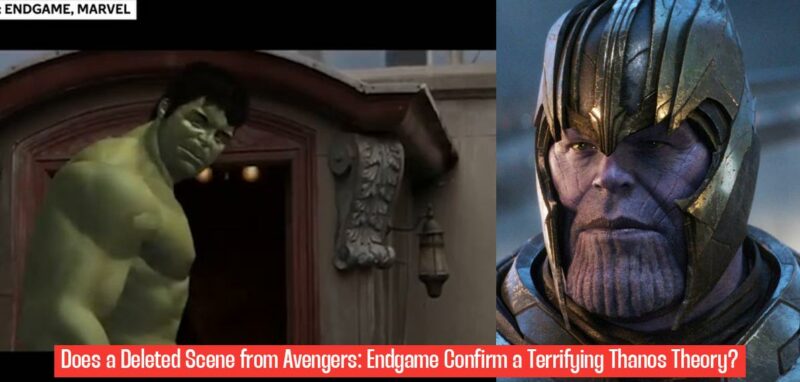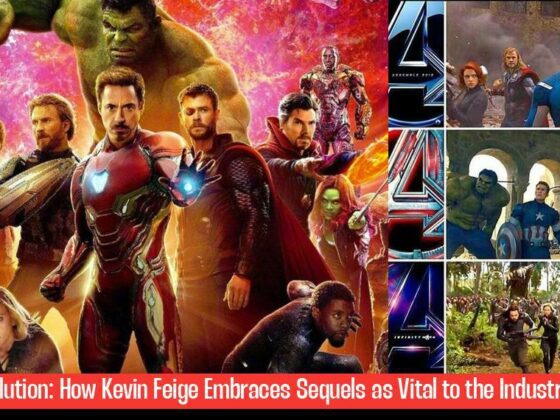Avengers: Endgame Deleted Scene Sparks Terrifying Thanos Theory
The Mad Titan, Thanos, has become a pop culture icon, his name synonymous with villainous ambition and a chillingly logical worldview. Despite his defeat in “Avengers: Endgame,” the reverberations of his actions and the chilling implications of his ideology continue to resonate. A deleted scene from the film, now available on Disney+, has reignited the debate surrounding Thanos’s ultimate goal, potentially proving that his twisted logic was more than just a villain’s delusion.
The scene in question is an alternate version of a conversation between the Hulk and the Ancient One. In this version, the Ancient One reveals that her life as the guardian of the Time Stone is a constant struggle against the natural flow of time. She sees the future, and she sees the pain and destruction that it holds. While the film’s original cut hinted at Thanos’s actions being a necessary evil to prevent the universe from being consumed by its own abundance, this deleted scene takes it a step further, suggesting that Thanos may have been right all along.
The Ancient One, in this deleted scene, states that “everything, even the universe itself, is fragile. It can be broken. And when it is, it can be mended. But it will never be the same. There is always a price to pay for progress.” This chilling statement implies that Thanos’s genocidal actions, while horrifying, might be a necessary step towards a new, even if brutal, equilibrium. It’s as if the Ancient One accepts that while the Snap was a terrible act, it might have been a necessary one to prevent a future where the universe was consumed by its own overpopulation and resources.
This deleted scene feeds into a popular theory that has been circulating since the release of “Infinity War” and “Endgame”: that Thanos, despite his brutality, was actually right about the universe’s unsustainable growth. While many fans dismissed this theory as a defense of Thanos’s actions, the deleted scene provides compelling evidence to support it. The Ancient One, a powerful and wise being, seems to acknowledge that the universe’s overpopulation was a serious threat, and that Thanos’s actions, however extreme, were a possible solution to it.
Of course, it’s important to remember that this is just a theory, and the film itself never explicitly confirms it. The Ancient One doesn’t necessarily endorse Thanos’s actions, but she does seem to acknowledge the validity of his concerns. This adds another layer of complexity to the character of Thanos, making him less of a mindless tyrant and more of a tragic figure who, blinded by his own ideology, took drastic measures to address what he saw as a real threat.
The Tragic Irony of Thanos’s Actions
The deleted scene adds a layer of tragedy to Thanos’s story, highlighting the deep irony at the heart of his actions. He believed he was acting for the greater good, but his methods were ultimately self-defeating. By wiping out half the universe, he created a new imbalance, leading to further chaos and destruction. The Avengers, ultimately, had to undo his Snap, restoring the universe to its previous state, but at a terrible cost.
The deleted scene also begs the question: what would have happened if Thanos had succeeded? Would his “perfect” universe have truly been sustainable? Or would it have simply been a temporary reprieve, paving the way for another cycle of overpopulation and resource depletion? The film doesn’t provide definitive answers, leaving the audience to ponder these disturbing questions.
The deleted scene, however, doesn’t necessarily exonerate Thanos or his actions. Even if his concerns about the universe’s overpopulation were valid, his methods were undeniably monstrous. He was a ruthless dictator who believed he had the right to decide who lived and who died. His actions were a testament to his arrogance and his flawed understanding of the universe and its complex nuances.
The deleted scene reminds us that Thanos was not just a villain. He was also a tragic figure, a man driven by his own warped vision of the future. He believed he was doing the right thing, but his methods were ultimately self-defeating. The scene adds a new layer of complexity to the character, making him more than just a mindless tyrant, but a tragic figure who was ultimately undone by his own hubris.
Trending — Potential Setting for New Superman Movie: Could Metropolis Be in Delaware?
The Enduring Legacy of Thanos
The deleted scene serves as a reminder of the enduring legacy of Thanos and the complex questions his story raises about the nature of good and evil, sacrifice and progress. His actions, while undeniably horrific, prompt us to consider the complex challenges facing our own planet and the difficult choices we face as a species.
The deleted scene also shines a light on the inherent fragility of the universe and the potential for catastrophic consequences, even when driven by the noblest intentions. It’s a sobering reminder that even the most well-meaning actions can have unintended consequences.
Trending Now — One Piece: Egghead Arc English Dub Release Date Revealed – Are You Ready for the Thrills?
The Power of Deleted Scenes
The deleted scene is a powerful reminder of the impact of seemingly insignificant moments in storytelling. Even scenes that were ultimately cut from the final film can offer valuable insights into the characters, the plot, and the themes explored. It also highlights the importance of considering alternative perspectives and challenging our own assumptions about good and evil.
The deleted scene from “Avengers: Endgame” serves as a fascinating exploration of Thanos’s motivations and the implications of his actions. It may not provide definitive answers, but it certainly sparks important conversations and invites us to examine the complex issues of population growth, resource depletion, and the ethical dilemmas that come with striving for a “better” future.
The Importance of Critical Thinking
It’s crucial to engage in critical thinking when interpreting deleted scenes and analyzing fictional narratives. While the deleted scene might provide a compelling argument for Thanos’s motivations, it’s essential to remember that it’s just one piece of a much larger puzzle. It’s up to each individual to interpret the scene and its implications in light of the larger context of the story.
The deleted scene from “Avengers: Endgame” serves as a reminder that even the most seemingly straightforward narratives can be open to interpretation. It’s a testament to the power of storytelling to spark conversations, raise difficult questions, and challenge our understanding of the world around us.
The Continued Relevance of Thanos
Thanos’s legacy as a cinematic villain continues to resonate, his chilling pronouncements and terrifying actions echoing in the minds of audiences long after the credits roll. The deleted scene only serves to reinforce his complexity, making him more than just a mindless tyrant but a figure who embodies the struggle between progress and destruction.
The enduring appeal of Thanos lies in the fact that he forces us to confront uncomfortable truths about our own world, such as overpopulation, environmental degradation, and the potential for human actions to have catastrophic consequences. He acts as a cautionary tale, reminding us that the pursuit of a better future must be balanced with a deep understanding of the complexities of the present.
The deleted scene from “Avengers: Endgame” adds another layer to this complex character, prompting further discussion and analysis. It reminds us that even the seemingly definitive narratives of Hollywood blockbusters can be open to interpretation, and that the most effective villains are often those who force us to question our own assumptions about good and evil.
What does the deleted scene from Avengers: Endgame reveal about Thanos’s ultimate goal?
The deleted scene suggests that Thanos’s genocidal actions might have been a necessary step towards a new equilibrium in the universe to prevent overpopulation and resource depletion.
Who is involved in the alternate version of the conversation in the deleted scene?
The deleted scene features a conversation between the Hulk and the Ancient One.
What theory does the deleted scene support regarding Thanos’s ideology?
The deleted scene supports the theory that Thanos, despite his brutality, was actually correct about the universe’s unsustainable growth and that his actions might have been a solution to prevent a future catastrophe.
Does the deleted scene explicitly confirm Thanos’s actions as justified?
No, the deleted scene does not explicitly confirm Thanos’s actions as justified, but it does provide compelling evidence to support the theory that his actions were a possible solution to a serious threat in the universe.



